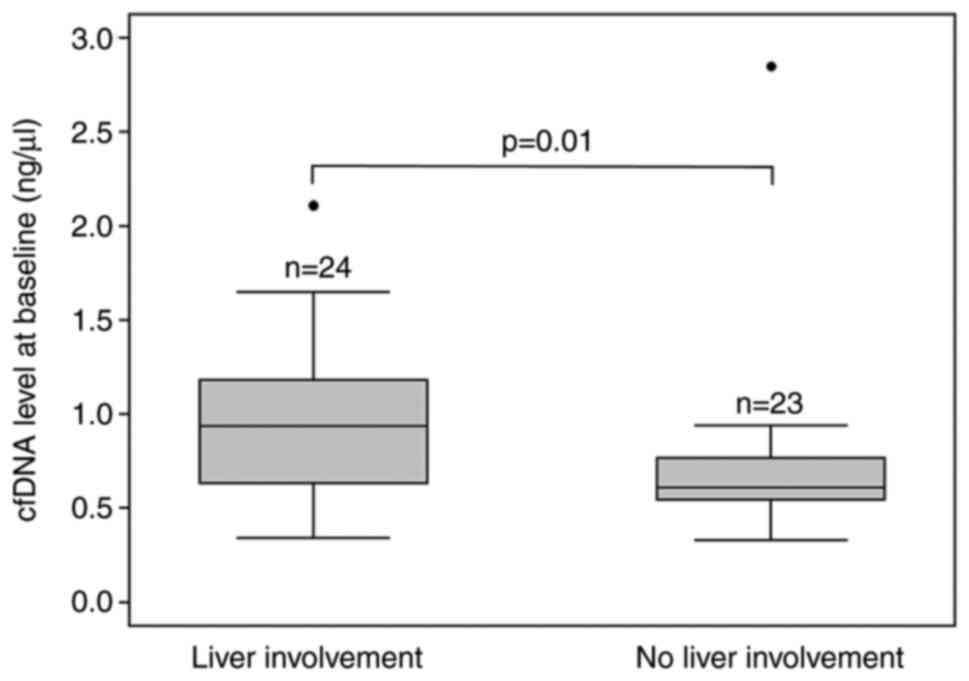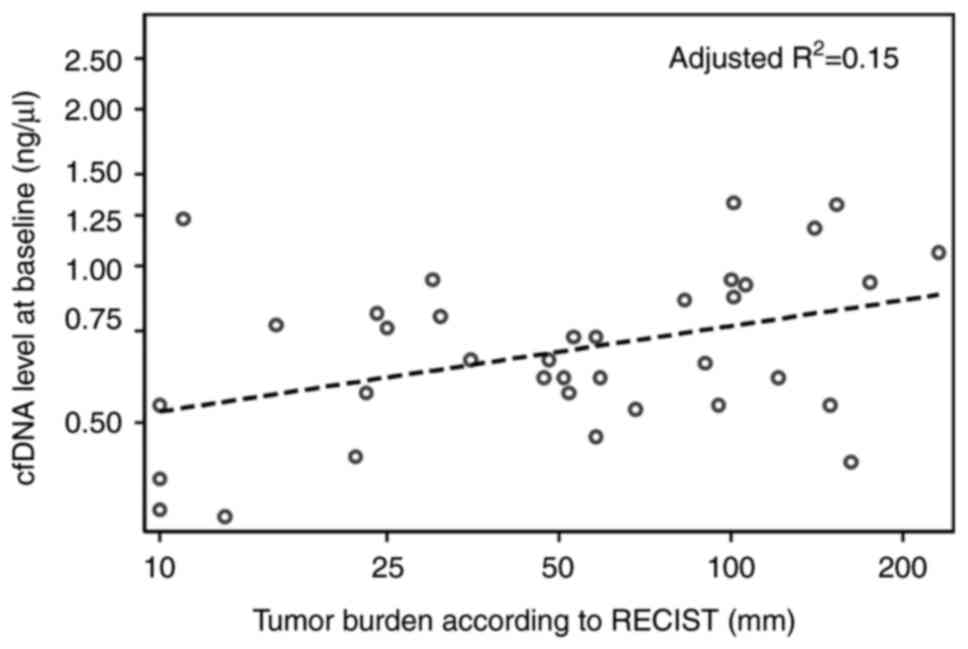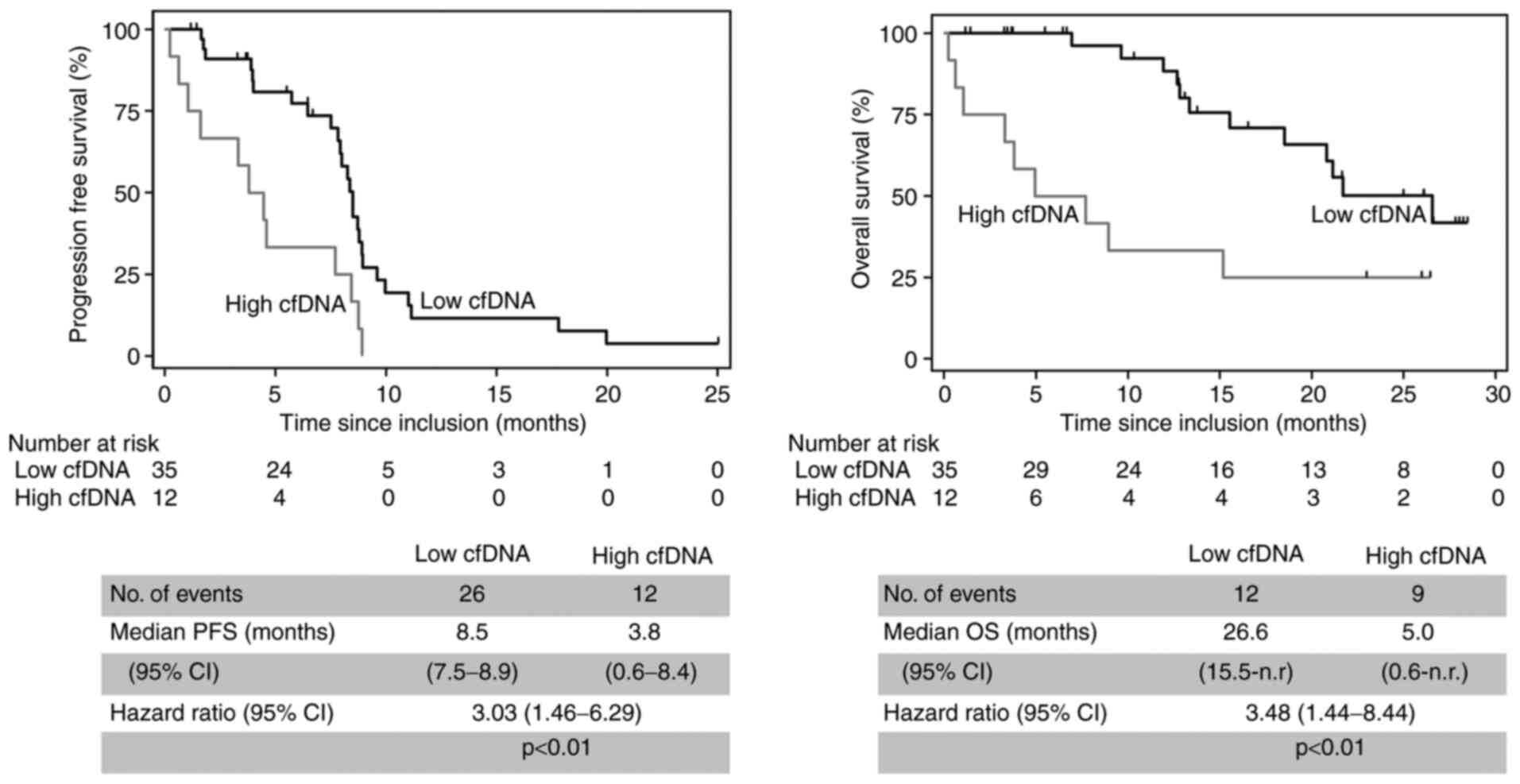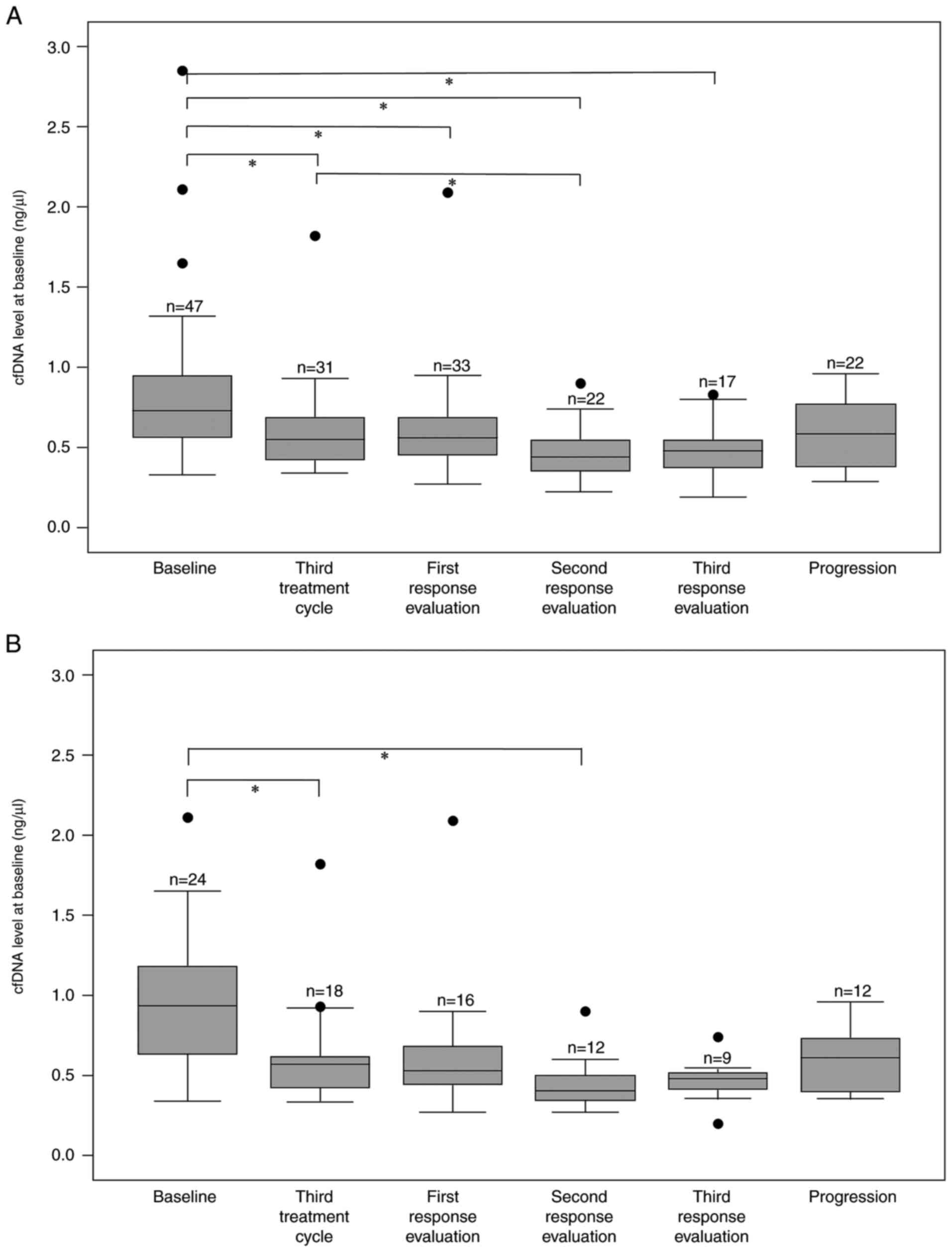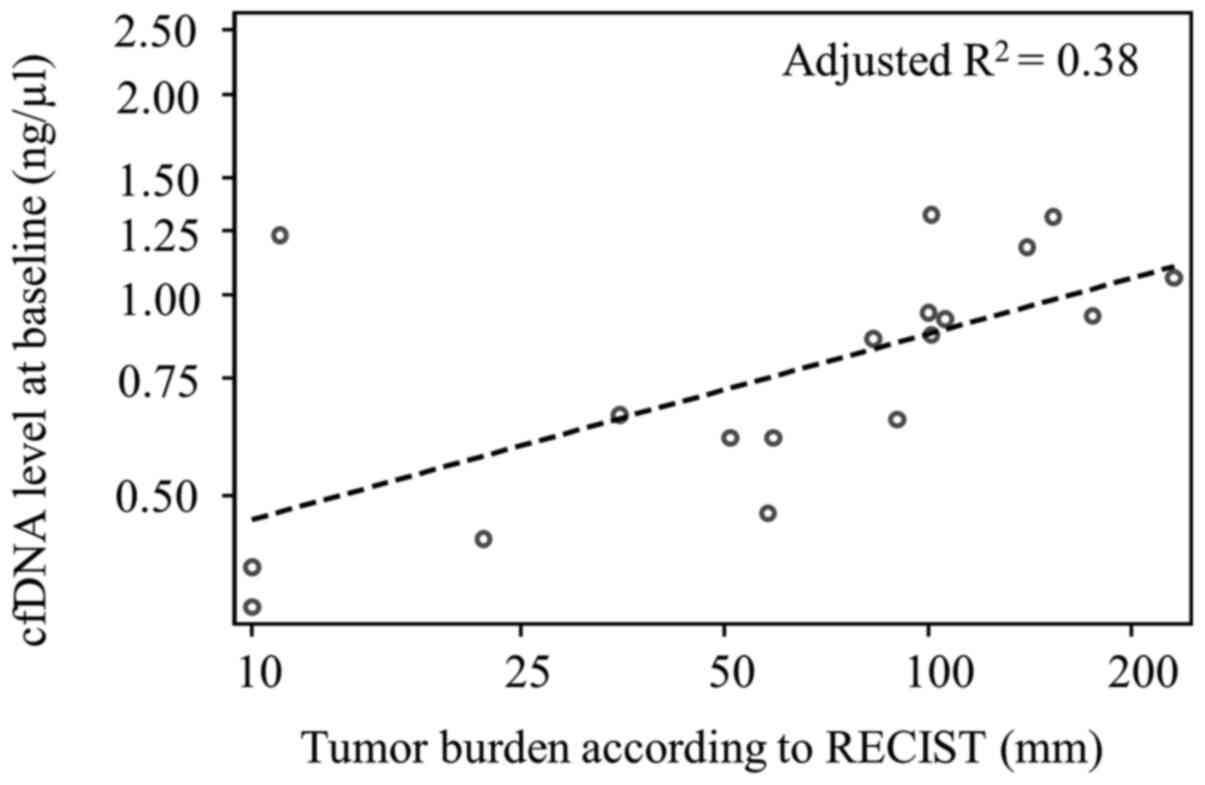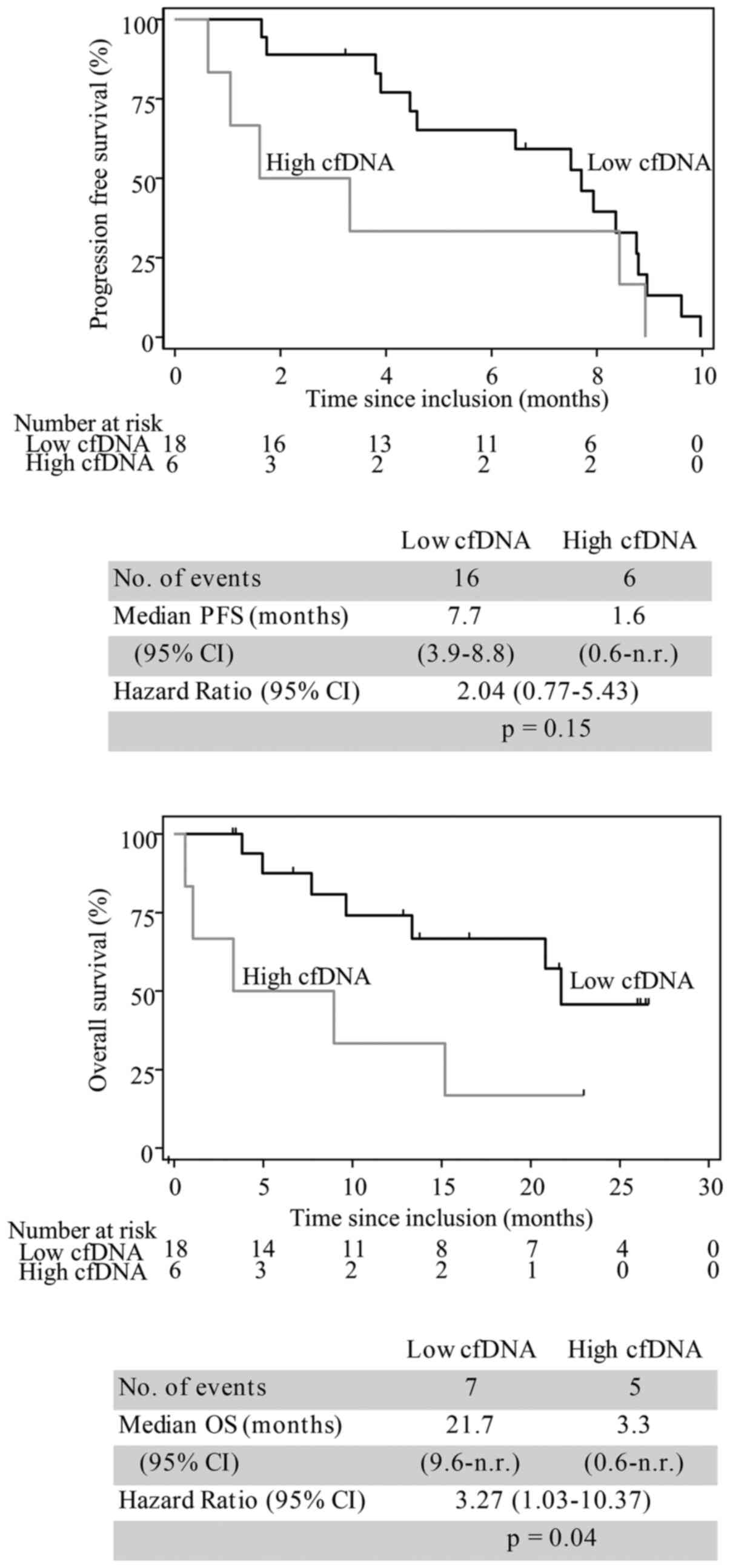|
1
|
Bray F, Ferlay J, Soerjomataram I, Siegel
RL, Torre LA and Jemal A: Global cancer statistics 2018: GLOBOCAN
estimates of incidence and mortality worldwide for 36 cancers in
185 countries. CA Cancer J Clin. 68:394–424. 2018.PubMed/NCBI View Article : Google Scholar
|
|
2
|
van der Geest LG, Lam-Boer J, Koopman M,
Verhoef C, Elferink MA and de Wilt JH: Nationwide trends in
incidence, treatment and survival of colorectal cancer patients
with synchronous metastases. Clin Exp Metastasis. 32:457–465.
2015.PubMed/NCBI View Article : Google Scholar
|
|
3
|
Van Cutsem E, Cervantes A, Nordlinger B
and Arnold D: ESMO Guidelines Working Group. Metastatic colorectal
cancer: ESMO clinical practice guidelines for diagnosis, treatment
and follow-up. Ann Oncol. 25 (Suppl 3):iii1–iii9. 2014.PubMed/NCBI View Article : Google Scholar
|
|
4
|
Mandel P and Metais P: Les acides
nucléiques du plasma sanguin chez l'homme. C R Seances Soc Biol
Fil. 142:241–243. 1948.PubMed/NCBI
|
|
5
|
Leon SA, Shapiro B, Sklaroff DM and Yaros
MJ: Free DNA in the serum of cancer patients and the effect of
therapy. Cancer Res. 37:646–650. 1977.PubMed/NCBI
|
|
6
|
Stroun M, Anker P, Maurice P, Lyautey J,
Lederrey C and Beljanski M: Neoplastic characteristics of the DNA
found in the plasma of cancer patients. Oncology. 46:318–322.
1989.PubMed/NCBI View Article : Google Scholar
|
|
7
|
Spindler KL, Appelt AL, Pallisgaard N,
Andersen RF, Brandslund I and Jakobsen A: Cell-free DNA in healthy
individuals, noncancerous disease and strong prognostic value in
colorectal cancer. Int J Cancer. 135:2984–2991. 2014.PubMed/NCBI View Article : Google Scholar
|
|
8
|
Spindler KL, Pallisgaard N, Andersen RF,
Brandslund I and Jakobsen A: Circulating free DNA as biomarker and
source for mutation detection in metastatic colorectal cancer. PLoS
One. 10(e0108247)2015.PubMed/NCBI View Article : Google Scholar
|
|
9
|
Spindler KL, Pallisgaard N, Vogelius I and
Jakobsen A: Quantitative cell-free DNA, KRAS, and BRAF mutations in
plasma from patients with metastatic colorectal cancer during
treatment with cetuximab and irinotecan. Clin Cancer Res.
18:1177–1185. 2012.PubMed/NCBI View Article : Google Scholar
|
|
10
|
Spindler KL, Pallisgaard N, Andersen RF
and Jakobsen A: Changes in mutational status during third-line
treatment for metastatic colorectal cancer - results of consecutive
measurement of cell free DNA, KRAS and BRAF in the plasma. Int J
Cancer. 135:2215–2222. 2014.PubMed/NCBI View Article : Google Scholar
|
|
11
|
Spindler KG, Boysen AK, Pallisgård N,
Johansen JS, Tabernero J, Sørensen MM, Jensen BV, Hansen TF,
Sefrioui D, Andersen RF, et al: Cell-Free DNA in metastatic
colorectal cancer: A systematic review and meta-analysis.
Oncologist. 22:1049–1055. 2017.PubMed/NCBI View Article : Google Scholar
|
|
12
|
Goldshtein H, Hausmann MJ and Douvdevani
A: A rapid direct fluorescent assay for cell-free DNA
quantification in biological fluids. Ann Clin Biochem. 46(Pt
6):488–494. 2009.PubMed/NCBI View Article : Google Scholar
|
|
13
|
Boysen AK, Sørensen BS, Lefevre AC,
Abrantes R, Johansen JS, Jensen BV, Schou JV, Larsen FO, Nielsen D,
Taflin H, et al: Methodological development and biological
observations of cell free DNA with a simple direct fluorescent
assay in colorectal cancer. Clin Chim Acta. 487:107–111.
2018.PubMed/NCBI View Article : Google Scholar
|
|
14
|
Schou JV, Larsen FO, Sørensen BS, Abrantes
R, Boysen AK, Johansen JS, Jensen BV, Nielsen DL and Spindler KL:
Circulating cell-free DNA as predictor of treatment failure after
neoadjuvant chemo-radiotherapy before surgery in patients with
locally advanced rectal cancer. Ann Oncol. 29:610–615.
2018.PubMed/NCBI View Article : Google Scholar
|
|
15
|
Boysen AK, Jensen M, Nielsen DT, Mortensen
FV, Sørensen BS, Jensen AR and Spindler KL: Cell-free DNA and
chemoembolization in patients with liver metastases from colorectal
cancer. Oncol Lett. 16:2654–2660. 2018.PubMed/NCBI View Article : Google Scholar
|
|
16
|
Boysen AK, Schou JV, Jensen BV, Nielsen D,
Sørensen BS, Johansen JS and Spindler KG: Prognostic and predictive
value of circulating DNA for hepatic arterial infusion of
chemotherapy for patients with colorectal cancer liver metastases.
Mol Clin Oncol. 13(77)2020.PubMed/NCBI View Article : Google Scholar
|
|
17
|
Lefèvre AC, Kronborg C, Sørensen BS, Krag
SRP, Serup-Hansen E and Spindler KG: Measurement of circulating
free DNA in squamous cell carcinoma of the anus and relation to
risk factors and recurrence. Radiother Oncol. 150:211–216.
2020.PubMed/NCBI View Article : Google Scholar
|
|
18
|
Eisenhauer EA, Therasse P, Bogaerts J,
Schwartz LH, Sargent D, Ford R, Dancey J, Arbuck S, Gwyther S,
Mooney M, et al: New response evaluation criteria in solid tumours:
Revised RECIST guideline (version 1.1). Eur J Cancer. 45:228–247.
2009.PubMed/NCBI View Article : Google Scholar
|
|
19
|
McShane LM, Altman DG, Sauerbrei W, Taube
SE, Gion M and Clark GM: Statistics Subcommittee of the NCI-EORTC
Working Group on Cancer Diagnostics. REporting recommendations for
tumour MARKer prognostic studies (REMARK). Eur J Cancer.
41:1690–1696. 2005.PubMed/NCBI View Article : Google Scholar
|
|
20
|
Nygaard AD, Holdgaard PC, Spindler KL,
Pallisgaard N and Jakobsen A: The correlation between cell-free DNA
and tumour burden was estimated by PET/CT in patients with advanced
NSCLC. Br J Cancer. 110:363–368. 2014.PubMed/NCBI View Article : Google Scholar
|
|
21
|
Thomsen CB, Hansen TF, Andersen RF,
Lindebjerg J, Jensen LH and Jakobsen A: Early identification of
treatment benefit by methylated circulating tumor DNA in metastatic
colorectal cancer. Ther Adv Med Oncol.
12(1758835920918472)2020.PubMed/NCBI View Article : Google Scholar
|
|
22
|
Spindler KL, Pallisgaard N, Appelt AL,
Andersen RF, Schou JV, Nielsen D, Pfeiffer P, Yilmaz M, Johansen
JS, Hoegdall EV, et al: Clinical utility of KRAS status in
circulating plasma DNA compared to archival tumour tissue from
patients with metastatic colorectal cancer treated with
anti-epidermal growth factor receptor therapy. Eur J Cancer.
51:2678–2685. 2015.PubMed/NCBI View Article : Google Scholar
|
|
23
|
Hamfjord J, Guren TK, Dajani O, Johansen
JS, Glimelius B, Sorbye H, Pfeiffer P, Lingjærde OC, Tveit KM, Kure
EH, et al: Total circulating cell-free DNA as a prognostic
biomarker in metastatic colorectal cancer before first-line
oxaliplatin-based chemotherapy. Ann Oncol. 30:1088–1095.
2019.PubMed/NCBI View Article : Google Scholar
|
|
24
|
Spindler KG, Demuth C, Sorensen BS,
Johansen JS, Nielsen D, Pallisgaard N, Hoegdall E, Pfeiffer P and
Vittrup Jensen B: Total cell-free DNA, carcinoembryonic antigen,
and C-reactive protein for assessment of prognosis in patients with
metastatic colorectal cancer. Tumour Biol.
40(1010428318811207)2018.PubMed/NCBI View Article : Google Scholar
|
|
25
|
Pallisgaard N, Spindler KL, Andersen RF,
Brandslund I and Jakobsen A: Controls to validate plasma samples
for cell free DNA quantification. Clin Chim Acta. 446:141–146.
2015.PubMed/NCBI View Article : Google Scholar
|















